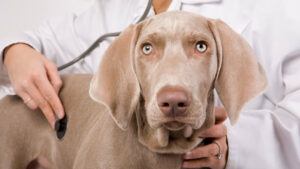
I’ve heard a few people say CBD has helped them with body aches, headaches, and pain in general. Does CBD work for older dogs who may be a little arthritic, but still want to run with you?
People can tell you when they’re in pain or what makes them feel better, but dogs can’t. So how do we know if CBD helps an older dog’s mobility?
What is CBD?
CBD, which is short for cannabidiol, is a natural compound extract from the hemp plant. cannabidiol is just one of 113 cannabinoids found within the hemp plant. Of these 113 cannabinoids, THC and CBD are the most widely studied and used. THC is the compound in marijuana that creates the “high” feeling. CBD, if pure, will have no THC and will not create a “high” feeling..
CBD & the ECS (Here comes the science stuff)
CBD works together with the ECS ( endocannabinoid system ) to control a wide range of physical effects throughout the body – such as regulating and maintaining the respiratory, circulatory, digestive, excretory, nervous, endocrine, skeletal, and immune systems.
Humans (and all mammals including dogs and cats) have an endocannabinoid system. So whether we are talking about the ECS in humans or dogs – they generally work in the same manner and have similar results. What works for most humans will probably work for most dogs.
Researchers are still trying to understand the ECS, but one thing they know for sure is that the ECS is made up of a network of cannabinoid receptors (CB-1 and CB-2 receptors). Though they have effects throughout the body, CB-1 receptors are mostly in the nervous system including the brain, CB-2 is located mostly in immune support areas.

These receptors have specific reactions when they come in contact with phytocannabinoids (such as CBD). Your body naturally makes endocannabinoids. Endocannabinoids are a similar compound to CBD, and it creates a similar reaction to the one made by CBD.
In fact, the cannabinoid receptors cannot tell the difference between your body’s naturally produced endocannabinoid and phytocannabinoids from the hemp plant. This may be a great example of nature being there to supply, or supplement, what we lack as we age.
Homeostasis = Health
The reactions by the ECS that regulate so much of the body (respiratory, circulatory, digestive, excretory, nervous, endocrine, skeletal, and immune systems) are believed to be responsible for maintaining homeostasis in the body. Homeostasis is the natural, balanced condition that optimally supports life. When CBD interacts with the ECS, it is believed to reinforce the proper balancing functions within the body and its major systems.
What are the benefits of CBD for dogs?
The research is still ongoing and there is no FDA approval yet, but preliminary results of national studies and the large numbers of anecdotal testimonials suggest that CBD may be useful for:
-
- Joint pain
- Stimulating appetite
- Some digestive issues
- Healthy sleep
- promotes mood or comfort levels
Nervousness and phobias (during my reading I have seen this claim made and this claim denied). According to PetMD.com, “Perhaps the biggest misconception is that CBD is useful in managing a dog’s anxiety. In theory, it is possible that CBD, by reducing pain and inflammation, could indirectly reduce anxiety caused by pain or inflammation.
But because CBD is not psychoactive, it is unlikely that CBD has the ability to directly treat canine anxiety in the way that Prozac and other medications do. The use of CBD for anxiety in dogs, as with most conditions, requires substantially more research.
What are the possible side effects of CBD for dogs?
Again, The research is still ongoing regarding the side effects of CBD usage for dogs, Based on how CBD affects humans below are some potential side effects. To minimize any potential side effects, make sure you are following the proper dosage.
-
- Dry mouth: Research has shown that CBD can decrease the production of saliva. For dogs, this would manifest as increased thirst.
- Lowered blood pressure: High doses of CBD have been known to cause a temporary drop in blood pressure. Even though the drop is small, it might create a brief feeling of light-headedness.
- Drowsiness: Dog owners have used CBD to treat anxiety. The calming effect of CBD can also cause slight drowsiness, especially when using higher doses.
- Liver enzymes may be higher: Research shows that high doses of CBD can inhibit the production of some liver enzymes, which could interfere with the metabolism of some drugs. If your pet is currently being given any medication you should consult with your vet before you give your dog CBD.
 What do vets say about CBD?
What do vets say about CBD?
When talking about any topic regarding your dog’s health your vet should be consulted. So, I asked my vet about CBD. My dog is young but spooked by bad weather, especially thunderstorms. I saw hemp for sale in the pet store to reduce anxiety so I asked my vet if it works. He smiled, didn’t say anything but prescribed a drug to calm my pup down.
I think vets can’t recommend CBD for legal reasons. There is no FDA approval for CBD, but the FDA has approved the drug he prescribed for Lily.
According to PetMD.com , a website written and reviewed by veterinarians:
“U.S. veterinarians are forbidden from prescribing/dispensing CBD, and cannot encourage or instruct clients to purchase CBD products.
However, they are free to talk to you about the potential risks and benefits of a treatment plan you may have devised on your own. If you are considering giving CBD to your dog, speak to your vet, and you may want to also speak with a veterinarian who has experience with CBD.”
As far as mobility in older dogs, I believe most vets prescribe certain supplements for joint health, like Cosequin Joint Health Supplement. It is a scientifically researched nutritional supplement recommended by veterinarians to help dogs maintain healthy joints.
Another non-CBD product called Pet Honesty claims to have helped over 50,00 dogs improve their mobility. 90% of all dogs that have tried the supplement have been helped. Their product has many ingredients. One of the primary ingredients is the green lipped mussel only found only in New Zealand.
If you’ve decided to try CBD what should you look for?
Quality. That’s the most important thing to look for.
-
- You want to check into where the hemp in the product was grown. CBD from hemp grown in the U.S.A., specifically from Colorado or Oregon, is known to be amongst some of the highest quality in the world.
- CBD from hemp grown outside of the U.S. can have high amounts of pesticides or other toxins.
 Look for the “organic” label. Organic CBD products won’t contain any artificial additives or chemical residues. NON-GMO products or products with a label displaying it as organic are just safer.
Look for the “organic” label. Organic CBD products won’t contain any artificial additives or chemical residues. NON-GMO products or products with a label displaying it as organic are just safer.- How much CBD is in the product? Look for the certificate of analysis (COA). The COA will also tell you if there is any THC in the product. You don’t want THC in your CBD. And if there’s very little CBD it will help your dog very little. Only buy CBD products with a certificate of.
- Is it too cheap? With most CBD, you get what you pay for. Cheaper products are most likely single-molecule CBD isolate which are not as beneficial as the products made from full-spectrum CBD oil.
Conclusion
The take away from my research is that the jury is still out. Most of the preliminary studies have been related to seizures. There is very promising evidence that CBD has a dramatic effect in reducing seizures in people and dogs.
There’s a lot of anecdotal evidence that the benefits listed above occur in most dogs though not all. Allergies and other unknown factors may prevent CBD from being effective in your dog. While you’re looking into this topic to make sure it’s right for your pup, you might want to stop by this Facebook group.
If you decide to try to make your older dog more comfortable with CBD the dosage is very, very important. “Go low and slow”. Give a dog small amounts of CBD first and then monitor the effects before increasing the dosage. Dosage is based on weight . Here is a calculator for CBD oil drops.
CBD is available for dogs in various forms. CBD oil is dispensed with an eye dropper and is very concentrated. CBD treats are less concentrated. But if your dogs are anything like mine (always begging for a treat) you should be careful of over dosage.
CBD: Fad… or the future?
CBD is all the rage right now. It seems like I see a new CBD store ( for people) open around here everyday. It’s part of the trend of legalization of Canabis, though CBD doesn’t have any THC – the compound in canibis that gives people the “high”.
CBD appears to be a natural remedy that may reduce your pet’s discomforts without all the side effects of traditional prescription drugs. If taken in small amounts, and monitored closely, the risk seems minimal.
If your vet is open to it, have a talk with them. CBD may offer your old friend some comfort and pain relief.
If you’d like to look at what over 400 unbiased users of CBD said regarding their experience with giving it to their dog, please visit this survey report.


